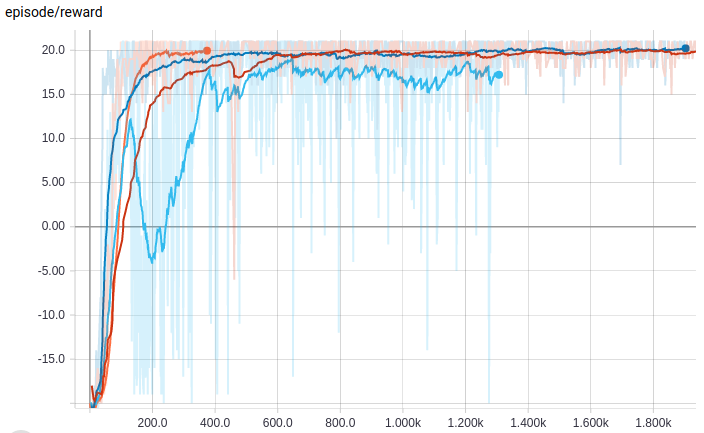PyToRL: PyTorch Toolbox for Reinforcement Learning
[PROJECT CURRENTLY UNDER DEVELOPMENT]
Simple Description:
This project, named pytorl, is intended to be an RL toolbox for pytorch and contains RL algorithm implementations using this pytorl toolbox. As I am currently learning RL, I am going to update this project with other agents, algorithms and faster or more efficient implementations soon.
Current Progress:
Implemented 4 DQN(and its variants) algorithms and a distributed DQN learning algorithm named Gorila via parameter server architecture. Will move on to A2C, A3C, TRPO, PPO ... Note that I use slurm for distributed RL training since my work is done on clusters, but I still provide a "local run" option which helps the project runs without slurm :).
Some Dependencies Currently Used for Developing:
gym == 0.10.11 with atari
numpy == 1.14.3
python == 3.6.5
pytorch == 1.0.1
tensorboard = 1.9.0
tensorboardX == 1.4
Simple Setup from Scratch:
# 1. clone this repo to local
$ git clone <this repo address>.git
# 2. run simple setup script
# the <path> here is where you want to put your experiments latter on
# your experiments launched by this toolbox provided "rl-run" entry will be
# automatically moved to the <path> and start executing at there rather than
# running directly at the dir currently you are working on, good for developing
$ python dev_setup.py -dir <path>
Run Example Projects after Setup:
# run_project folder contains scripts for job starting
$ cd examples/<project main folder>/run_project
$ sh <script filename> [-h] <options>
# for example, you can try sh ATARI.sh -N testrun --local
# you can always use sh <script filename> [-h] for options help
Demo of Some RL Results:

(reward/episode while training ale atari PongNoFrameskip-v4 via diff. DQN algorithms)
Acknowledgements:
- During the development, I referred to some helpful resources, listed as follows:
- @qfettes/DeepRL-Tutorials repo for nice tutorials and designs
- @openai/baselines for some implementations
- my mentor and colleague Huabin Zheng (https://dblp.org/pers/hd/z/Zheng:Huabin)
for technical consultation and extraordinary design ideas - other helpful sources and geniuses from websites such as stackoverflow, GeeksforGeeks, etc.
Thanks them all for making our open source world a better place! :)